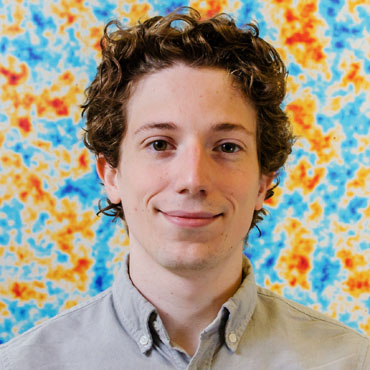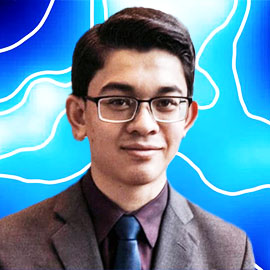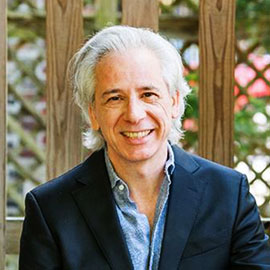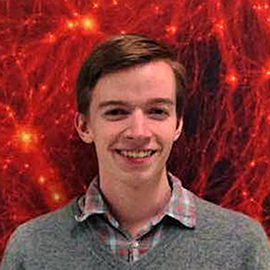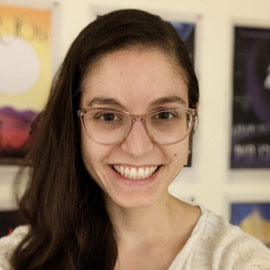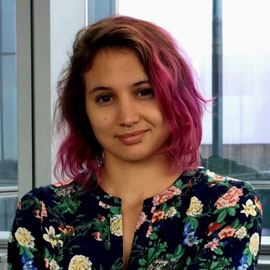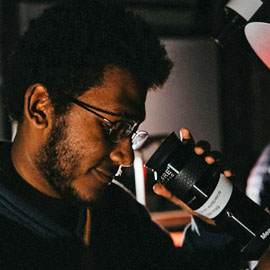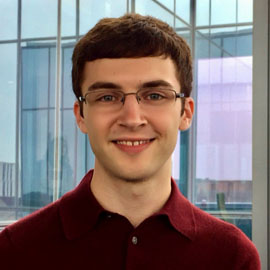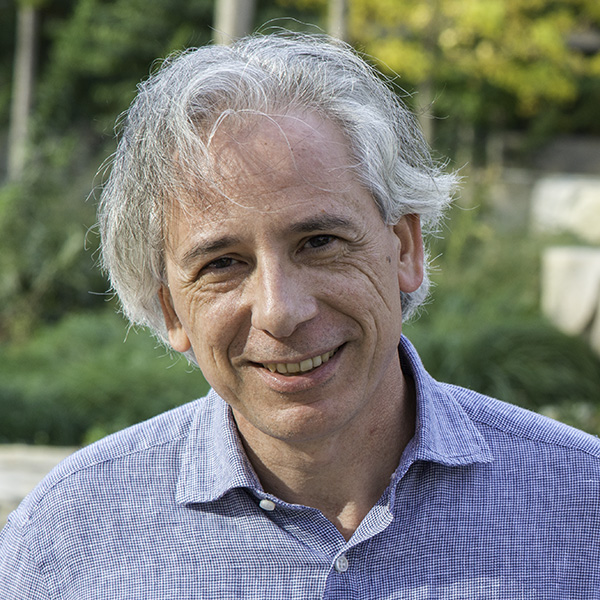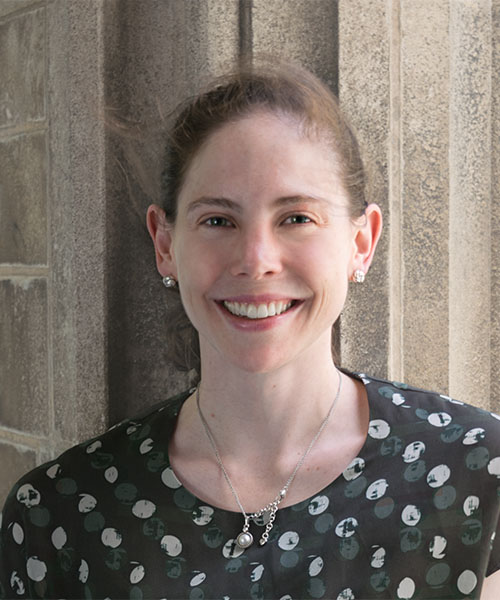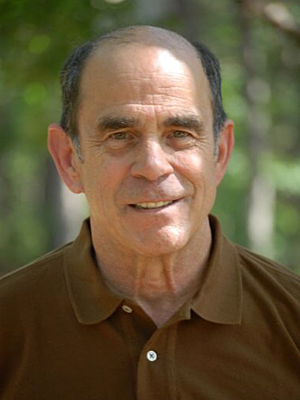 |
 |
 |
 |
 |
 |
 |
 |
 |
 |
 |
 |
|
News
|
Department News: 2020
Congratulations to Dr. Sam Passaglia July 24, 2020 Congratulations to Sam Passaglia for successfully defending his Ph.D. dissertation on "The Black Hole Window on Cosmic Inflation". Sam has accepted a postdoctoral position at the Kavli Institute for the Physics and Mathematics of the Universe. "Sam Passaglia's thesis research focused on the origin of inhomogeneities during a period of cosmic inflation in the early universe. In particular, Sam has elucidated the roles of the single clock, single field, and Gaussian assumptions, often made in the simplest models for inflation, through their impact on primordial black hole formation in the broad class of effective field theories of inflation." - Wayne Hu, Ph.D. advisor Related: Department members: Wayne Hu Department students: Sam Passaglia Congratulations to Dr. Philip Mansfield July 22, 2020 Congratulations to Philip Mansfield for successfully defending his Ph.D. dissertation on "Why Do Dark Matter Halos Die Together? An Intergalactic Murder Mystery". Philip has received a position of a KIPAC fellow at Stanford University. "Phil Mansfield's thesis research focused on understanding of properties and clustering of dark matter halos forming in the Cold Dark Matter scenario. In particular, during this thesis work Phil has made significant contributions to our knowledge about reliability of measurements of properties of dark matter halos in cosmological N-body simulations and our understanding of the physical origins of the assembly bias of dark matter halos. Phil has also made exemplary efforts in education, outreach, and mentoring high-school and undergraduate students." - Andrey Kravtsov, Ph.D. advisor Related: Department members: Andrey V. Kravtsov Department students: Philip Mansfield Jared Siegel has been awarded a Chambliss Astronomy Achievement Student Award June 15, 2020 Dear Colleagues, In the spirit of celebrating the achievements of our undergrad Astro majors, I am happy to announce that one of the undergrad students working with me, Jared Siegel, has been awarded a Chambliss Astronomy Achievement Student Award medal for his poster on supernova remnant W49B at the recently concluded 236th AAS meeting. He made a very nice poster, complete with audio commentary. Jared already has one published journal paper, and another one submitted. And he's just finished his second year. Vikram V Dwarkadas Research Professor Dept. of Astronomy and Astrophysics, U Chicago Related: Department members: Vikram Dwarkadas Prof. Paolo Privitera won a Graduate Teaching and Mentoring Award June 9, 2020 "Finding who you are, what you do best and what you enjoy doing will bring you in the right direction -- in research, and more broadly, in life," says Prof. Paolo Privitera. "For this reason, I do not rush the students to focus on a single big project when they start working with me." Rather, Privitera has each of his graduate students try the many different tracks that physicists can take -- from simulating the highest energy particles in the universe, to analyzing the raw data that comes out of big experiments, to designing and building bits of detectors to find, say, dark matter. Related: Department members: Paolo Privitera Telescope Named for Nancy Grace Roman May 21, 2020 NASA has named its next-generation space telescope under development, the Wide Field Infrared Survey Telescope (WFIRST), in honor of Nancy Grace Roman, NASA's first chief astronomer, who paved the way for space telescopes focused on the broader universe. The newly named Nancy Grace Roman Space Telescope - or Roman, for short -- is set to launch in the mid-2020s. Considered the "mother" of NASA's Hubble Space Telescope, which launched 30 years ago, Nancy Grace Roman tirelessly advocated for new tools that would allow scientists to study the broader universe from space. She left behind a tremendous legacy in the scientific community when she died in 2018. "It is because of Nancy Grace Roman's leadership and vision that NASA became a pioneer in astrophysics and launched Hubble, the world's most powerful and productive space telescope," said NASA Administrator Jim Bridenstine. "I can think of no better name for WFIRST, which will be the successor to NASA's Hubble and Webb Telescopes." Roman is designed to be able to settle essential questions in the areas of dark energy, exoplanets, and infrared astrophysics. All telescope time and all data are available to the wider astronomical community for its use in conducting major surveys and general observer projects. The Roman project passed a critical programmatic and technical milestone in February, giving the mission the official green light to begin hardware development and testing. Congratulations to Nora Shipp and Megan Mansfield May 20, 2020 Dear Colleagues, I am most pleased to report that Nora Shipp and Megan Mansfield have been selected to receive William Rainey Harper Dissertation Fellowships! The award is one of the University of Chicago's highest honors and is given in recognition of outstanding achievement and professional promise. Nora's dissertation research is on the discovery and modeling of Milky Way stellar streams, supervised by Alex Drlica-Wagner. Megan's dissertation research is on the characterization of exoplanet atmospheres. She is a GeoSci graduate student, supervised by Jacob Bean. Please join me in congratulating Nora and Megan! John Carlstrom, Department Chair and Subramanyan Chandrasekhar Distinguished Service Professor Related: Department members: Jacob L. Bean, Alex Drlica-Wagner Department students: Nora Shipp New A&A Faculty Appointments May 20, 2020 Dear Colleagues, I am delighted to report that Alexander Ji and Austin Joyce will be joining our department as Assistant Professors, with appointments starting July 1, 2021. I thank the search committee and the entire department for bringing such outstanding scientists to our department. Congratulations to us! John Carlstrom, Department Chair and Subramanyan Chandrasekhar Distinguished Service Professor Philip Mansfield has won a 2020 Sugarman Award May 17, 2020 Congratulations to Phil Mansfield on receiving the 2020 Sugarman Award! "For substantial research contributions to our understanding of properties and clustering of dark matter halos forming in Cold Dark Matter scenario, as well as exemplary efforts in education, outreach, and mentoring high-school and undergraduate students." - Andrey Kravtsov, Ph.D. advisor NATHAN SUGARMAN, Professor Emeritus in the Enrico Fermi Institute and the Department of Chemistry, was devoted to the Institute and to the education of its students. The Sugarman Award Fund honors this commitment through its annual awards for student achievements in research. Related: Department members: Andrey V. Kravtsov Department students: Philip Mansfield Planning for the Year Ahead May 15, 2020 Robert J. Zimmer May 15, 2020 I write to update you on planning for the eventual resumption of activities on campus. Given the complexity and scope of campus activities and many uncertainties, planning requires the development and analysis of a number of possible scenarios for the upcoming academic year. This work must account for a complex set of factors involving the pandemic and how it will impact the University community. Our work as a community on these issues will be guided by the University's highest academic values and our commitment to realizing these values now and in the future. These foundational principles include providing a transformative education that allows students to develop the habits of mind and intellectual skills needed to confront complex challenges; ensuring that faculty have an intellectually free and challenging environment in which to pursue the most original and deepest research; and fostering University work that has a positive impact on understanding the world and improving the quality of human life. As the pandemic unfolds in the coming months, our planning work is being guided by these priorities: - Academic Quality - We must maintain the distinctive qualities and values of our academic community that sustains our approach to education, research, and intellectual life at the University. - Public Health Considerations - A paramount objective is to protect the health of students, faculty, staff, and visitors to the University. We will rely extensively on guidance from the University of Chicago Medicine (UCM), which has some of the world's leading experts in infectious disease and maintaining public health. Some of the relevant issues under discussion include the availability of widespread testing and its interpretation, use of face coverings and personal protective equipment (PPE), the level of population density in various campus environments and the relationship to the potential spread of COVID-19, social distancing, quarantine when necessary, protecting vulnerable populations, and building a campus culture in which each individual recognizes our individual and collective responsibility for maintaining a healthy environment. - Government Guidance - We will act in alignment with the guidelines of public health agencies at the federal, state, and local levels. This will include alignment with the state Restore Illinois plan, and Chicago's framework consistent with that plan. We are closely evaluating these materials and their implications for our campus plans in the coming months. - Financial Sustainability - We will work to mitigate financial risks that the pandemic has caused for all major institutions of higher education, including ours, while offering as much support as possible for University faculty, students and staff, bearing in mind the severe financial impact of the pandemic, globally and at the University. - Regular Updates - We will continue to communicate plans and expectations to ensure that we have a common understanding of what is ahead of us, with a decision by the end of June concerning plans for the Autumn Quarter. A team of physicians and leaders from UCM is providing expert guidance on theconditions under which students, faculty, other academic appointees, and staff could aggregate in various venues on campus. To drive planning for COVID-19 management under a range of possible scenarios, I have asked Katie Callow-Wright, EVP of the University and Chief of Staff in the Office of the President, to work with me in convening groups to work on key areas starting with the following: - Research - Education (taking into account differences among the College, divisions, and schools) - Housing and Dining - Offices and Staff - K-12 Education, including the Laboratory Schools and the UChicago Charter School - National Labs The provost and Office of the Provost will be involved in all of these groups, and other officers of the University, the deans, and their respective offices will likewise be involved in areas connected to their responsibilities. These areas have diverse needs and the planning effort is a complex task. Surveys on the Spring Quarter will be sent to faculty and students to gain input and help shape best practices. In all areas, we will engage academic leaders, faculty, and staff to plan for a range of scenarios. In some cases this will include the development of a dual mode arrangement, with some in-person activities combined with the continuation of some work done remotely. In addition to these six areas, our planning work will take into account the larger campus experience, such as student services, pre-orientation and orientation programs, admissions, events, alumni relations and development, commercial activity, campus centers and museums, and community engagement. A website is being finalized and more information and updates will soon be available. Ultimately, we aim to create the best conditions for all members of our campus community to have a safe, healthy, and productive year. We will continue to keep you updated as planning progresses. Congratulations to Dr. Maya Fishbach May 7, 2020 Congratulations to Maya Fishbach for successfully defending her Ph.D. dissertation on "Astrophysics and Cosmology with Gravitational Waves". Maya has received a NHFP Einstein Fellow position at the Northwestern University. "Maya has done influential work in the new field of gravitational-wave astrophysics. She is a leader in the population analysis of gravitational-wave sources, and her high-impact results include recognizing the upper mass gap of binary black holes, standard siren measurements of the Hubble constant using both counterpart and statistical approaches, a new probe of cosmology using a feature from pair-instability supernovae, and novel methods to explore mass and spin distributions as probes of compact binary formation channels." - Daniel E. Holz, Ph.D. advisor Related: Department members: Daniel E. Holz Department students: Maya Fishbach Scientific projects: Laser Interferometer Gravitational-wave Observatory Research Resumption May 5, 2020 Ka Yee C. Lee, Provost May 5, 2020 On April 23, 2020, Governor Pritzker issued an extension of our state's 'stay at home' order through May 30th, in line with public health recommendations from federal authorities, to continue the progress that we have witnessed in combating the COVID-19 pandemic. While ensuring the health and safety of our community is paramount, the impact of the widespread closures on our research enterprise has been significant. The centrality of research to the University of Chicago cannot be overstated and planning a safe return to research activities is a high priority. To address this, the Office of the Provost has convened a faculty committee to provide guidance on principles for a phased reintroduction of on-campus research. The committee is working on the assumption that research resumption will occur in stages based on the overall status of the pandemic in Chicago and Illinois, guidance from State and City Public Health authorities, and prevailing conditions at the University. Please note that while the Governor's order extends through May 30th, we encourage all researchers and other work in education and administration to continue remote activities until further notice whenever possible. The guidance of the faculty committee will inform implementation planning by deans and detailed preparations by individual research groups, which we expect to begin by mid-May. Our work will proceed in close collaboration with the Medical Center to establish state-of-the-art safety protocols and logistical planning for safe resumption of research. Foremost is the need to ensure that we do whatever we can to reduce health risks to faculty, other academic appointees, students, and staff. This will include preparing best practices for personal protective equipment, coronavirus testing as appropriate, and detailed plans for social distancing within eachresearch area, as well as plans for regular cleaning in accordance with public health guidelines. The deans and other academic leaders will be in further communication with labs about these topics in the days and weeks ahead. I want to thank the University of Chicago research community for meeting these unprecedented challenges with generosity of spirit, and for continuing to pursue new knowledge and innovations in the face of this pandemic. Samantha Usman has been awarded a Fermilab Computational Science Internship April 24, 2020 Dear Colleagues, I am most pleased to announce that Samantha Usman has been awarded a Fermilab Computational Science Internship. Congratulations Samantha! John Carlstrom, Department Chair and Subramanyan Chandrasekhar Distinguished Service Professor Related: Department students: Samantha Usman David Zegeye has been awarded a NSF Graduate Student Fellowship April 24, 2020 Dear Colleagues, I am most pleased to announce that David Zegeye has been awarded a NSF Graduate Student Fellowship. Congratulations David! John Carlstrom, Department Chair and Subramanyan Chandrasekhar Distinguished Service Professor Cory Cotter has been awarded a NSF Graduate Student Fellowship April 24, 2020 Dear Colleagues, I am most pleased to announce that Cory Cotter has been awarded a NSF Graduate Student Fellowship. Congratulations Cory! John Carlstrom, Department Chair and Subramanyan Chandrasekhar Distinguished Service Professor Related: Department members: Damiano Caprioli Department students: Cory Cotter Paolo Privitera has been selected as a winner of the Faculty Award for Excellence in Graduate Teaching and Mentoring April 21, 2020 Dear Colleagues, I am delighted to announce that Paolo Privitera has been selected as a winner of the Faculty Award for Excellence in Graduate Teaching and Mentoring. It is particularly noteworthy that nominations for this award are made by UChicago students and alumni. Please join me in congratulating Paolo. John Carlstrom, Department Chair and Subramanyan Chandrasekhar Distinguished Service Professor Related: Department members: Paolo Privitera Convocation 2020 | Robert J. Zimmer, President, and Ka Yee C. Lee, Provost April 7, 2020 From: Robert J. Zimmer, President, and Ka Yee C. Lee, Provost Date: April 7, 2020 The University of Chicago, informed by the epidemiology expertise at the Pritzker School of Medicine and the Medical Center, and in coordination with federal, state, and city agencies such as the Centers for Disease Control and Prevention (CDC), has taken a number of steps to contribute to the safety of our community and to participate responsibly in the effort to address the spread of COVID-19. Several of the actions we have taken have not been easy for the University community as a whole or for individual faculty, students, and staff who have been significantly affected in a variety of ways. Today, we are announcing additional difficult steps in the light of the current situation. The 533rd Convocation ceremonies will not be held on campus in June 2020 as originally planned. Given the current guidance from the CDC, other public health officials, and our own faculty and physicians working on the forefront of the COVID-19 response, and the understanding of the trajectory of the pandemic, it is not practical or responsible to proceed with planning an in-person gathering of more than 15,000 people. Though we cannot be together on campus this June, the importance of recognizing our students' collective academic accomplishments and conferring degrees remains. We are planning a virtual Convocation ceremony to take place on June 13, to confer degrees and celebrate the dedication and accomplishments of the Class of 2020. We are also prepared to deliver the physical diploma to each student who receives the degree as soon as possible thereafter. We invite all graduates in the Class of 2020 to return to campus in June 2021 and participate fully in the 534th Convocation ceremonies. We will use this opportunity for a special acknowledgement and celebration of the accomplishments of 2020 graduates in the presence of faculty, students' families, and the broader community. We recognize that participation in Convocation ceremonies is, for many, an irreplaceable experience, enjoyed with the whole University and in the company of one's friends, family, and classmates and we hope you will be able to join us in the spring of 2021 to do so. Students and faculty will hear from your deans and deans of students as plans for virtual or in-person activities for diploma ceremonies develop. The convocation site will be updated regularly as new information about diploma ceremonies and other activities for the class of 2020 becomes available. Since 1893, the University's convocation has brought together all elements of the University community: degree candidates and their families, alumni, friends, faculty, staff members, deans, officers and trustees of the University, the provost, and the president. Today the entire University of Chicago community, both on campus and beyond, is facing a deeply challenging situation. Our staff and patients at UChicago Medicine and their families are daily managing through an unprecedented, and our faculty, students, and staff, as well as the parents and families of our students, are facing a spring quarter none of us expected. The decisions we face now are difficult ones, but we must take our responsibility to each other and to the broader communities of which we are a part with the utmost seriousness. We share your disappointment in this news but remain confident that we will find appropriate ways as a University community to celebrate the Class of 2020 in ways both singular and enduring. Spring Quarter Message | Ka Yee C. Lee, Provost April 6, 2020 Dear Members of the University Community, As we begin our first day of Spring Quarter with the entire campus teaching and learning remotely, I wanted to take a brief minute to address you personally. Please click here for a video message. Sincerely, Ka Yee C. Lee Provost The University of Chicago Spring Quarter Robert J. Zimmer, President April 5, 2020 From: Robert J. Zimmer Date: April 5, 2020 This week our University of Chicago community will fully embark on a Spring Quarter without precedent - the first in which all classes will be taught remotely, with students and instructors dispersed throughout the world. While many scholarly activities are continuing, most in-person laboratory work on campus has been curtailed, as have workshops, conferences, and other academic gatherings. This is therefore a moment of enormous challenge, not only for critical global public health concerns and other important and related forms of well-being for our neighboring communities, not only for individual faculty and students in this new mode of instruction, not only for the many in our community who have had to react to a rapidly changing situation sometimes with considerable personal sacrifice, but for maintaining the key values, meaning, and features of our distinctive University of Chicago academic community. It is critical that while we operate in a different mode, we maintain those features that undergird our distinctive education and research environment: ongoing rigorous intellectual challenge and argument, freedom to explore and question, robust efforts to recognize and challenge assumptions whether our own or those of others, the deep engagement of multiple perspectives and modes of inquiry, the lack of deference to ideas because of authority or popularity, recognition of the importance of culture, history, and context, and the seriousness of intellectual purpose. The distinctive nature of our academic community and our approach to education and research did not happen by accident, and they have not endured by accident. Since its inception, the academic values and the distinctive meaning of the University of Chicago have been created and then recreated every day by the faculty, students, and staff on campus, and by the support of our alumni and friends. Since the University's inception in 1890, there have been many challenges the University, and its faculty, students, staff, and trustees have faced in their time to preserve, enhance, and recreate a university with an enduring commitment to intellectual challenge, rigor, and freedom and all that these entail. We all share the opportunity and responsibility to benefit from and contribute to this institution and its meaning, building upon the work of those who have come before us. We have arrived at a moment in which we as a community are called upon to meet the challenge of remote learning and academic engagement and to preserve our enduring values, approach, and meaning. Each one of us must do our part. We will surely learn from this experience and learn from each other. As in all experiments, not everything will go perfectly. But with commitment, energy, and resourcefulness, I am confident that we will not only preserve what is so distinctive about the University of Chicago, but also find new ways in which our enduring values and meaning can be realized. This is our challenge as a community, a challenge of our time. We must undertake it together and do so recognizing the importance of the task. Together we will succeed. I wish each of you success in your hard and challenging work in the coming quarter, and thank you for your commitment to the nature of education and research that the University of Chicago has always represented and must continue to represent. The Astronomy & Astrophysics Department actions | John E. Carlstrom, Chair March 14, 2020 Dear Colleagues, I write to encourage you to do your part to slow down the spread of COVID-19. The situation is evolving rapidly. The university administration is keeping us informed on their recommended policies, see the University's COVID-19 website, which includes FAQs about Spring Quarter. Recent University guidance includes: moving to remote learning for the Spring Quarter administering and evaluating winter quarter final exams online or through remote methods suspending University-sponsored events and gatherings of more than 100 people encouraging schools, divisions and departments to postpone on-campus visits suspending all nonessential international and domestic University travel ceasing normal operations of the University residence halls at the start of spring break encouraging remote work as appropriate, and social distancing The Astronomy & Astrophysics Department is taking the following steps, at least through April: Tuesday Pizza talks are suspended Wednesday A&A colloquia are suspended "Cookies, Coffee and Conversation” are suspended Prospective student visits will be held remotely We encourage that Group meetings be held via zoom, or in a large enough room to respect social distancinging antiviral wipes and hand sanitizers, please use them! Clean shared spaces before and after you use them. We will keep you informed as the situation evolves. Please contact us with your concerns and suggestions. We are all in this together. Thanks, John Related: Department members: John E. Carlstrom Our first AAS Legacy Fellows: John Carlstrom, Wendy Freedman, and Michael Turner February 25, 2020 Our first AAS Legacy Fellows: John Carlstrom, Wendy Freedman, and Michael Turner The AAS Fellows program was established in 2019 to confer recognition upon AAS members for achievement and extraordinary service to the field of astronomy and the American Astronomical Society. AAS Fellows are recognized for their contributions toward the AAS mission of enhancing and sharing humanity's scientific understanding of the universe.Click on the image to enlarge Our first AAS Legacy Fellows: John Carlstrom, Wendy Freedman, and Michael Turner. Read more Related: Department members: John E. Carlstrom, Wendy L. Freedman, Michael S. Turner Leslie Rogers receives 2020 Cottrell Scholar Award February 11, 2020 Dear colleagues, I am most pleased to report that the Research Corporation for Science Advancement has selected Leslie Rogers to receive a 2020 Cottrell Scholar Award. Leslie will receive $100,000 in support of her research on Searching for Water in Distant Worlds: Connecting the Atmospheric and Bulk Compositions of Sub-Neptune-Size Planets. To learn more see. Please join me in congratulating Leslie on this well deserved honor. John Carlstrom, Department Chair and Subramanyan Chandrasekhar Distinguished Service Professor Related: Department members: Leslie Rogers 2020 LAD Laboratory Astrophysics Prize Goes to James Truran January 22, 2020 Dear All, Please join me in congratulating Jim Truran, Professor Emeritus with the Department of Astronomy and Astrophysics, on receiving the 2020 Laboratory Astrophysics Prize of the AAS Laboratory Astrophysics Division (LAD). The prize is given in recognition of Jim's theoretical work on early star formation and the nucleosynthesis history of the universe, as well as for his seminal contributions to the study of astrophysical thermonuclear explosions, nucleosynthesis, and the use of nuclear-decay chronometers to determine ages of stellar and terrestrial matter. The Laboratory Astrophysics Prize is LAD's highest honor. Congratulations Jim! John Carlstrom, Department Chair and Subramanyan Chandrasekhar Distinguished Service Professor Related: Department members: James W. Truran |

